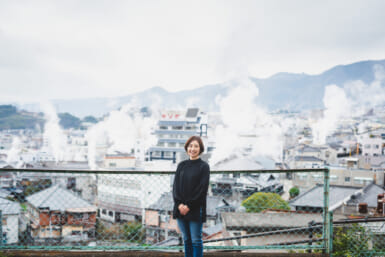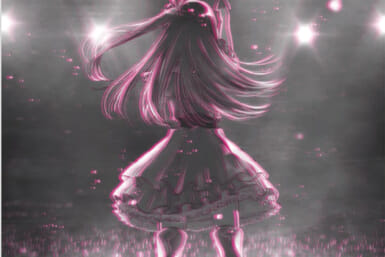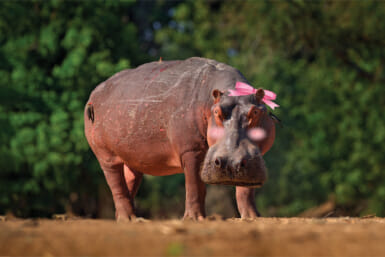by Joan Itoh Burk
When author Thomas Wolfe wrote his 1940 novel “You Can’t Go Home Again,” he probably didn’t realize the intensity of emotions of longtime residents of Japan. Eight years ago personal circumstances took me away from these islands that were most surely home to me for more than 17 years. Somehow the Oriental gods smiled, allowing me to become part of that exclusive group of foreigners who managed a comfortable niche in a society that is so homogenous that they brand every Caucasian who ever touched their shores “outsiders.”
Nevertheless, I felt very “at home” in Japan. The word “gaijin” even had a nice ring to my ears.
I suppose every country has special words for newcomers or stangers in its land, many far worse than “gaijin” As for being stared at, that sometimes disconcerting habit of mostly younger Japanese was much worse years ago when I first arrived, but it never upset me so much. They never seemed to be what you might call “negative stares”; just curious ones.
It was almost like being some kind of celebrity. Also I was never annoyed when Japanese would approach to practice their English with the red-haired gaijin lady. Most of them turned out to be delightful young people who made many a long train ride more interesting.
No, in fact I always felt very much at home here. Even my foreign registration card— the infamous AR — read “permanent resident.”
Since the time of my departure, there have been some dramatic changes, and yet so much has remained absolutely the same- The world’s awareness of Japan has grown in leaps and bounds — not always gracefully.
When I first went back to North America, people yawned politely when they heard that I’d been living so long in Japan. After awhile, I stopped talking about it as no one understood parts of my vocabulary, “So what is a mikan” one lady in New York inquired. But even that indifference to Things Japanese changed in a while.
Lots of Japanese words crept into the English language. People now knew sushi and karaoke — not to mention Honda, Toyota and Subaru. The media was peppered with complaints of mass layoffs in the automotive industry, or that yet another American bank had been bought up with super yen.
We all heard about how the Japanese in Hawaii were offering people fantastic prices for their ordinary homes. And terms such as “dumping” and “unfair trade imbalance” became more associated with Japan than cherry blossoms and Mount Fuji.
And then one Sunday evening, millions in North America watched the popular TV program “60 Minutes” and were shocked to hear a list of well-known American properties that now had Japanese landlords.
And yet many Americans don’t seem to want to face the reality of what is happening. They have ¥¥ signs in their eyes as they sell off buildings and hotels and precious American landmarks without a thought for the future. Recently released figures show that Japanese doubled their U.S. assets in 1987, making Japan the top foreign investor. According to the Department of Commerce, assets of Japanese companies increased 99.6 percent to $196 billion, moving Japan from third to No. 1.
I know enough about the Japanese to appreciate their fine points and to understand their weaknesses. They were very good losers; I don’t think they will be gracious winners. Until the language structure changes, Japanese will continue to have a feudal mentality and I can’t see many Americans in any generation getting the hang of when to bow lower than the other guy or to recognize that there are certain occasions when very, very polite language is absolutely necessary.
The Japanese word for America is “Beikoku“… the character translates as “rice country.” When I lived in Niigata the old farmers would translate it the old way which somehow came out, “What a Big Place to Grow Rice”.
Back in the U.S, people once again started talking about Japan. A certain uneasiness had put it back on the “interesting conversation” list. The old yawns didn’t exactly turn into bated breath, but a lot of questions were on their minds and being an Old Japan Hand gave me an advantage. It put me on the local rubber-chicken circuit and, after accepting enough Rotary and Kiwanis luncheon invitations, I decided to put out my own shingle.
People wanted to know what the Japanese were thinking. I know a little about that; I was married to one long enough.
My name card now reads “Joan Itoh Burk, Japan Consultant.” The trip “back home” to Japan that I am currently enjoying was with an American company desiring to begin conducting business with Japan. It went well and after putting my clients on the plane back to New York, I stayed on to take a refresher course in Things Japanese. After a couple of weeks on my own here, I have decided that Japan is as much a paradox as ever.
Everything has changed—and nothing has changed.
No physical changes are obvious. Everything is packed more tightly than ever and, although there are many new attractive buildings, there are as many new ugly ones, too. There is still no building code evident and you can still find streets filled with houses that suggest a choir all singing the same words to entirely different tunes.
The Japanese are managing to squeeze every bit of charm out of the city that once was Old Edo. Concrete buildings press against concrete buildings, giving some neighborhoods the ambience of an open sardine can. A wisp of garden behind a weathered wooden fence is almost a thing of the past and one wonders how the Japanese can survive without a hint of fresh air to give solace to their crowded bodies and souls.
How can people who have so often waxed eloquent about being “part of nature” keep piling glitz upon plastic upon concrete — and still be happy?
Most grevious of all, in my mind, is the uprooting of old shrines and plunking them on top of yet another concrete beast. Surely having to travel 20 stories up in an elevator does something to reduce religious fervor. Better to have committed the shrine to the sacred fires than to leave them only to the crows, up on their inaccessible, undignified perches. Is greed the only god alive and well in Tokyo these days?
It seems that the old gentle ways of regarding money in Tokyo has changed to something resembling the Osaka merchants. “Have You Made a Profit Today?” may one day replace “Konnichiwa.”
There are still the “haves” and “have nots” — only it’s more like the “haves” and “think they have.” In one subway car I counted three real Louis Vuitton handbags, yet I’ll bet those young ladies take their expensive merchandise back to their tiny, crowded, rented rooms with never a hope in hell of being able to own their own home.
Not even the super-yen has been able to give the average Japanese a life-style that can hold a candle to that in the West and that smacks of something being very, very wrong.
There must be more to it than just an insufficient amount of land. The most educated people in the world should expect more value for the long hours of work they put in. There is something about this society that is as sad as watching a squirrel in a cage, working so hard, round-and-round, at getting nowhere. A Louis Vuitton bag is not the end of the rainbow — but the sad values of many of today’s Japanese seem to think so.
Yes, things have changed… but much is still the same. Just open the Weekender to experience a halt in time. The letters-to-the-editor are still written by Kenny Joseph and Rudolf Voll and are still harping on the same old subjects. You would have thought these epistles were churned out 10 years before.
And friends didn’t change. Some very special bonds can be made in this country — with foreigners and Japanese alike. After 10 minutes of talking to them, it was as if I had never been away. I suppose some of it is because being away from your native turf makes you look at people differently. Your friends become the family you choose, sharing holidays, happy times and sad times; episodes and events that build real bonds. Friendships like that don’t diminish with time. In Japan even casual friendships seem to last.
When a place is truly “home,” you leave some of yourself when you depart. My book “Rice Paddy Gourmet” can still be purchased in the English-language bookstores and my brain child. The Organization of Foreign Women Married to Japanese, is still going strong. It’s a nationwide association now and will celebrate its 20th anniversary this fall. Now that’s something to come home for.
The other day, I lost a lift on my shoe and went to the same shoe repair man in my old neighborhood. He looked up from his work, smiled and said, “Oh, Itoh-san; I haven’t see you for a long time. Have you been away?”
“Hai,” I answered, reduced to one word by my surprise. “Well, welcome home,” he said.
All I could manage was a “thank you.” For one lovely minute, I wanted to believe I was enjoying this love-hate relationship totally again and that I was really back to stay.
Meanwhile I’ll just enjoy the energy and excitement of “being home” again, at least for this short while.









